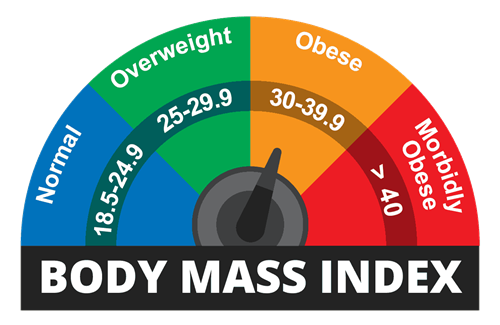A Parent's Guide to Understanding Children's BMI Development
A Guide for Parents

As parents we prioritise our children's health and well-being daily. One factor of their overall health that requires regular attention is their Body Mass Index (BMI) development. BMI is a measure of body fat based on height and weight, providing insights into a child's growth and potential risk for obesity-related health issues. So, in order to make informed decisions about nutrition, let's explore the significance of BMI, how it is calculated for children, and the factors that influence its development.
Understanding BMI
Body Mass Index (BMI) is calculated by dividing a person's weight (in kilograms) by the square of their height (in meters). For children, BMI is age and gender-specific, as their body composition changes rapidly during growth and development. CDC has an online BMI calculator for children and teenagers. The BMI value falls into a percentile range, indicating how a child's weight compares to their peers of the same age and gender. The percentiles are divided into categories such as underweight, normal weight, overweight, and obese. It is important to note that BMI is not a direct measurement of body fat but serves as a screening tool to assess potential health risks associated with weight status.
Factors Influencing BMI Development

Several factors influence the development of a child's BMI. Genetics, lifestyle choices, dietary habits, physical activity levels, and environmental factors all play significant roles.
Key factors to consider
1. Genetics
Genetic predisposition can influence a child's tendency to gain weight or develop certain body shapes. However, genetics alone do not determine BMI. Lifestyle and environmental factors also have a significant impact.
2. Lifestyle and Dietary Habits
A balanced and nutritious diet is crucial for healthy growth. Encouraging a variety of foods, portion control, and limiting sugary drinks and snacks can help maintain a healthy BMI. Eating habits, such as skipping meals or consuming high-calorie foods frequently, can contribute to weight-related issues.
3. Physical Activity
Regular physical activity is vital for children's overall health and maintaining a healthy BMI. Encourage your child to engage in age-appropriate activities and limit sedentary behaviors, such as excessive screen time. You can always find the right activity for your favorite mini human on Momizen.
4. Environmental Factors
The family environment and community play essential roles in shaping a child's BMI development. Access to healthy food options, safe play areas, and supportive family routines can positively influence a child's weight status.
Monitoring and Supporting a Healthy BMI

Having said all that let’s see what can we, as parents, can do to monitor and support our child's healthy BMI development:
1. Regular Check-ups
Schedule regular visits to the pediatrician for growth monitoring and BMI assessment. Healthcare professionals can provide guidance based on your child's individual needs.
2. Setting an example with observable actions
Be a positive role model by adopting healthy lifestyle habits yourself. Children often imitate their parents, so engaging in regular physical activity and making nutritious food choices can influence their behavior.
3. Family Meals
Encourage family meals where healthy food choices are served. This promotes a positive eating environment and fosters healthy relationships with food. You can also try cooking with your children, so that they can get more “hands on” healthy options on their plates.
4. Active Lifestyle
Incorporate physical activity into your family's routine. Plan outdoor activities, encourage sports participation, and limit sedentary behaviors. See here the best outdoor family activities in Zurich.
5. Communication
Educate your child about the importance of maintaining a healthy weight and explain BMI in an age-appropriate manner. Encourage open communication about their feelings and body image to address any concerns.

Understanding our child's BMI development is crucial for promoting their overall health and well-being. By sharing this article with your friends, you're not only empowering them with knowledge but also fostering a supportive community focused on the well-being of our children. Together, we can champion healthy habits, promote positive body image, and ensure a bright, thriving future for the next generation. Share this valuable information with your friends today and let's make a lasting impact on our children's lives.
Similar Articles
Dog-Friendly Playgrounds, Parks and Trails in Zurich. Unleashing Family Fun.
Raising Digital Natives: Tips For Teaching Your Children To Use ChatGPT Safely And Effectively
Gender Stereotypes That Modern Parents Still Make
3 Activities That Help Kids With ADHD Thrive
How To Sneak Veggies Into Your Children's Food
Sports Summer Day Camps in Zurich
Top 5 Museums For Kids In Zurich And Their Role In Children's Development
The Best Birthday Party Ideas For Kids & Teens In Luzern
Top 3 Safety Tips For Families In The Swiss Alps
Stress In Children And 5 Ways To Help Them Out
Bedtime routines for children of all ages
Top 5 Family Restaurants in Luzern
Top Books for Kids' Summer Reading
Gift Ideas For Dads, Kids & Teens
What to look for in children's foreign language classes
Are Language Learning Apps Really Effective?
Top 4 Language Apps for Kids and Teens
Why Kids Need to Code. Plus Everything You Need to Know As A Parent
8 Effective Tips for Raising Teens
Tips to help children eat more vegetables
Teaching Responsibility
The top list with the greatest birthday party ideas for kids and teens
How to keep children safe online
